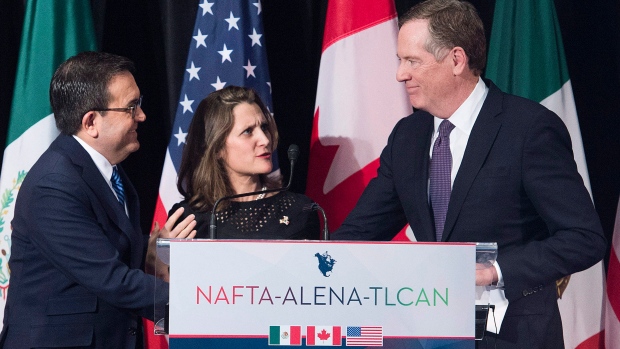Negotiations over NAFTA are bogging down ahead of a major deadline

Washington Post | 9 May 2018
Negotiations over NAFTA are bogging down ahead of a major deadline
by David J. Lynch and Damian Paletta
Negotiations over a new North American trade deal have hit a major snag, leaving White House officials increasingly uncertain of their ability to hit their May 18 deadline for securing congressional approval of a new deal before year’s end.
The main stumbling block involves a dispute over determiningwhich automobiles are given duty-free treatment under the agreement, according to five industry and U.S. government sources.
After almost nine months of negotiations, the United States and its trading partners , Canada and Mexico, remain far apart on a host of contentiousissues, including U.S. demands that the treaty mustbe renewed every five years.
Two weeks ago, White House officials were optimistic about prospects for a breakthrough in the talks, a senior administration official said. While U.S. officials have not abandoned hope, they acknowledge that the odds of quickly reaching a deal that fulfills President Trump’s campaign promise to return lost manufacturing jobs to the United States are growing longer, the official added.
“The moment of truth is upon us,” said Eric Miller, president of Rideau Potomac Strategy Group, a political advisory firm.
Missing next week’s deadline could have significant consequences, given the political calendars in both the United States and Mexico. Depending on what happens in the next 10 days, Trump could opt to pause the negotiations, claim a partial agreement or even withdraw from the existing accord, though that appears unlikely.
The president’s authority to negotiate trade deals that Congress must approve or reject without amendment expires July 1, coincidentally the date of Mexico’s presidential election. U.S. officials say that May 18 represents the deadline for securing congressional approval under his existing authority this year, given the various timelines specified in the legislation. (Other trade experts say that date could slip to later in the month if Congress was willing to delay its Christmas recess for the North American Free Trade Agreement.)
The front-runner in Mexico’s July 1 presidential election is populist Andrés Manuel López Obrador, who could prove a tougher negotiating partner if the negotiations continue past this month. And Democrats appear to be well-positioned to recapture the House of Representatives, complicating prospects for winning congressional assent to the new deal.
There has been talk that the administration might try to salvage the talks with a high-risk strategy involving withdrawing from the existing agreement and presenting Congress with a choice between no deal and a partial “agreement-in-principle.”
But several influential members of Congress have warned the president not to gamble.
“We write to express extreme concern over reporting that your administration is considering sending up to Congress a preliminary and incomplete NAFTA renegotiation based on ‘principles,’ ” Reps. Sander M. Levin (D-Mich.) and Ron Kind (D-Wis.) wrote in a letter to the White House. “Any attempt to hold Congress hostage would threaten your administration’s negotiating authority and only serve to sow chaos in the U.S. economy.”
House Republican leaders also have made clear to the White House that they need to see an agreement on paper before they will vote on renewing the president’s trade-negotiating authority, a person familiar with the exchange said.
Chief negotiators meeting in Washington this week are concentrating on efforts to break a deadlock over U.S. Trade Representative Robert E. Lighthizer’s insistence that any new treaty “rebalance” trade among the three North American nations in favor of the United States.
The United States wants 75 percent of each automobile given duty-free treatment under the agreement to consist of North American parts, up from the current 62.5 percent. The U.S. proposal would also require that 40 percent of the work making passenger cars be performed by workers making an hourly wage of at least $16 — far above Mexican factory workers’ average pay.
“If Mexico agrees to this, Mexico is agreeing to a smaller auto industry,” Miller said.
Mexico countered the U.S. plan on Tuesday, proposing a 70 percent North American content requirement, rejecting the U.S. wage figure and suggesting a 10-year phase-in period for the new rules, rather than the four years eyed by the Americans.
The lack of progress on a new NAFTA comes as the Trump administration is increasingly preoccupied with a growing trade dispute with China.
The U.S. trade representative’s office declined to comment. But a senior administration official confirmed the account of scant progress and a looming deadline, which was provided by severalindustry observers.
Some trade experts remain confident that a deal ultimatelycan be reached. “If they reach a deal on cars, the rest of this stuff will fall away,” said William Reinsch, a veteran trade analyst at the Center for Strategic and International Studies. “It always goes down to the wire. Nobody is walking out.”
Indeed, negotiators said after Tuesday’s talks that they were moving forward. Canadian Foreign Minister Chrystia Freeland said, “We are definitely making progress.”
But since beginning talks in August, the administration has missed several self-imposed deadlines as it seeks to conclude in months a complex diplomatic process that typically requires years.





